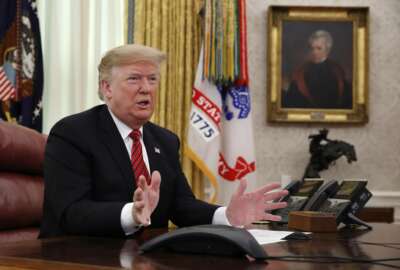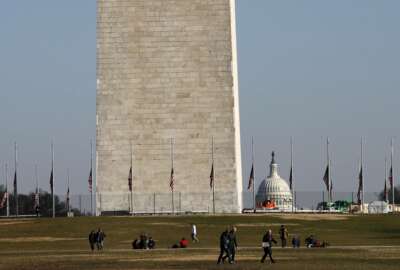
Is there a way out of the 2019 federal pay freeze?
A package of bills from House Democrats would reopen government, provide full-year funding for most federal agencies and give civilian employees a pay raise in ...
To no surprise, final word of the president’s plans to freeze pay for civilian employees in 2019 was met with anger and frustration from federal employee groups.
President Donald Trump made his planned pay freeze, which he first announced in releasing his proposed 2019 budget back in February and again in letters to Congress in August, official late last week — six days into a partial government shutdown.
The National Treasury Employees Union described the freeze as “pouring salt in the wound.” The National Active and Retired Federal Employees Association said Trump’s decision “amplified his disdain” for the federal workforce’s public service. The Federal Managers Association called it a “direct slap in the face.”
But there may be a way or two out of the freeze.
The clearest path — at least for the moment — lives inside the deal that House Democrats have put on the table to end the partial government shutdown and fund most agencies through the rest of the fiscal year.
Nancy Pelosi (D-Calif.), the House Speaker designate, on Monday unveiled a package of bills that would end the partial government shutdown and fund nearly all agencies except the Department of Homeland Security through the rest of fiscal 2019.
One package includes the six previously-agreed-to appropriations bills that Congress had nearly finalized before shutting parts of the government down on Dec. 22. It also includes a raise for civilian employees.
The second package grants DHS funding through Feb. 8 and includes $1.3 billion for border security.
The American Federation of Government Employees praised the plan from House Democrats and encouraged the Senate to take it up and send it to the President’s desk.
“I call on President Trump to take this opportunity to show hard-working and devoted federal employees, including federal law enforcement officers, that he values their work,” AFGE National President J. David Cox said Wednesday in a statement. “Please sign this bill, end this shutdown and stand up for America’s workforce by agreeing to this small pay adjustment that federal employees have earned.”
NARFE echoed AFGE’s call for action.
“Both the shutdown and the pay freeze impose real economic costs on federal employees and our country,” NARFE National President Ken Thomas said Wednesday in a statement. “Both undermine the effectiveness of the work our government does — from ensuring the national defense and homeland security to safeguarding taxpayer dollars from fraud — by damaging its ability to recruit and retain a highly qualified and talented workforce. I urge Congress to end both.”
Congress could, as some members had suggested late last year, also introduce standalone legislation or include a provision in an omnibus spending bill that would adjust pay for civilian employees in 2019 starting on a specific date. Or the provision could grant employees a raise retroactively from Jan. 1, but Congress would need to specify that such an adjustment is retroactive.
Maryland Democratic Sens. Ben Cardin and Chris Van Hollen said before the partial government shutdown began they were exploring whether it was legally feasible to introduce legislation that would grant civilian employees a retroactive pay raise after the new year.
A new letter to the president from Cardin and Van Hollen, Virginia Democratic Sens. Tim Kaine and Mark Warner, as well as Sens. Mazie Hirono (D-Hawaii) and Sherrod Brown (D-Ohio), suggests that plan is moving forward.
“We strongly encourage you to take immediate action to reverse your ill-advised pay freeze and lift federal workers from this added layer of financial uncertainty,” the senators wrote. “Should you choose not to change course, we will continue working on a bipartisan basis to ensure federal workers receive a pay adjustment for fiscal year 2019.”
Related Stories
“There should be a particular sense of urgency in bolstering, rather than undermining, the competitiveness of the federal workforce considering that the share of federal employees eligible for retirement is expected to rise to 30 percent in five years,” the letter reads.
Giving civilian employees a 1.9 percent raise in 2019, as the senators suggested in their recent letter to the President, by all accounts appears to have bipartisan agreement.
The Senate had already passed a 1.9 percent raise in its version of the financial services and general government appropriations bill.
House Republicans announced back in October that they had reached a deal to provide a 1.9 percent raise for federal employees and would include the measure in the final conference report for the financial services appropriations bill. But Democrats said they were skeptical of the agreement.
Copyright © 2024 Federal News Network. All rights reserved. This website is not intended for users located within the European Economic Area.
Nicole Ogrysko is a reporter for Federal News Network focusing on the federal workforce and federal pay and benefits.
Follow @nogryskoWFED





